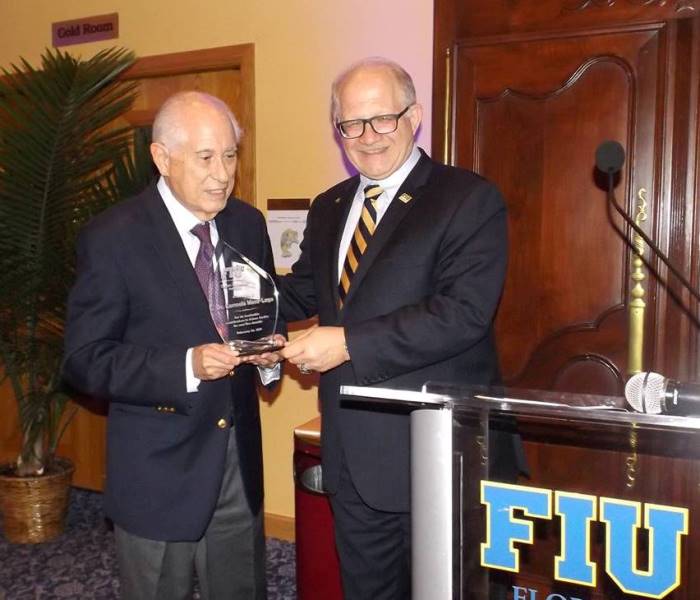
Dr. Carmelo Mesa-Lago received a dedication plaque from FIU President Dr. Mark Rosenberg.
FIU's Cuban Research Institute hosted its tenth biennial conference on Cuban and Cuban-American studies on February 26–28, 2015. The meeting, consisting of 45 panel sessions over three days, was the largest international gathering of scholars engaged in the study of Cuba and Cuban Americans, attracting over 350 participants from throughout the United States and other countries. The event was dedicated to the distinguished economist Carmelo Mesa-Lago, in recognition of his numerous contributions to Cuban studies over more than five decades.
This year's conference focused on racial politics in Cuba and the Americas, including presentations on Afro-Cuban music and art, Cuban-American literature, anti-racist activism, and contemporary civil society. Our main theme invited comparisons between Cuban experiences of race and those of other Latin American and Caribbean peoples (such as Puerto Ricans, Dominicans, Haitians, and Brazilians), as well as their diasporic communities. The conference attracted ample media attention.
The program featured prominent experts on Cuba and its diaspora, including Ruth Behar, Madeline Cámara, Manuel Cuesta Morúa, Alejandro de la Fuente, Cristóbal Díaz Ayala, Roberto G. Fernández, Ada Ferrer, Guillermo J. Grenier, Lillian Guerra, Andrea O'Reilly Herrera, Luis Martínez-Fernández, Ana Menéndez, Carmelo Mesa-Lago, Enrique Patterson, Silvia Pedraza, Gustavo Pérez Firmat, Marifeli Pérez-Stable, and Alan West-Durán. It also included many younger scholars and schoolteachers, as well as graduate and undergraduate students.
Conference highlights included a plenary session on Thursday morning, where stellar and emerging scholars of race relations Alejandro de la Fuente, Ada Ferrer, Andrea Queeley, and Danielle Clealand discussed historical and contemporary racial issues in Cuba. A roundtable discussion on recent changes in U.S.-Cuba relations included FIU Cuba experts Frank Mora, Darío Moreno, Marifeli Pérez-Stable, Marcos A. Kerbel, and Alexis Jardines Chacón. On Thursday evening, FIU President Mark Rosenberg and SIPA Executive Director John Stack hosted a welcoming reception in honor of Carmelo Mesa-Lago.
On Friday evening, CRI hosted the premiere of the PBS documentary Cuba: The Forgotten Revolution, directed by Glenn Gebhard, followed by a panel discussion with the director, Lucy Echeverría, Agustín País, and José Álvarez, and moderated by Lillian Guerra. The film focused on two forgotten revolutionaries who created the landscape for Fidel Castro's victory in 1959: Frank País, the head of the M-26-7 urban underground, and José Antonio Echeverría, the leader of the Directorio Revolucionario in Havana.
A panel on racial discrimination in contemporary Cuba was held on Saturday morning. Chaired by Rafel Campoamor Sánchez, it included Manuel Cuesta Morúa, Juan Antonio Madrazo, Fidel Guillermo Duarte González, Eric Fidel Toledo Acevedo, Surelys Vega Isás, and Kenya C. Dworkin y Méndez, with comments by Marifeli Pérez-Stable.
To view pictures of the conference, please click here.